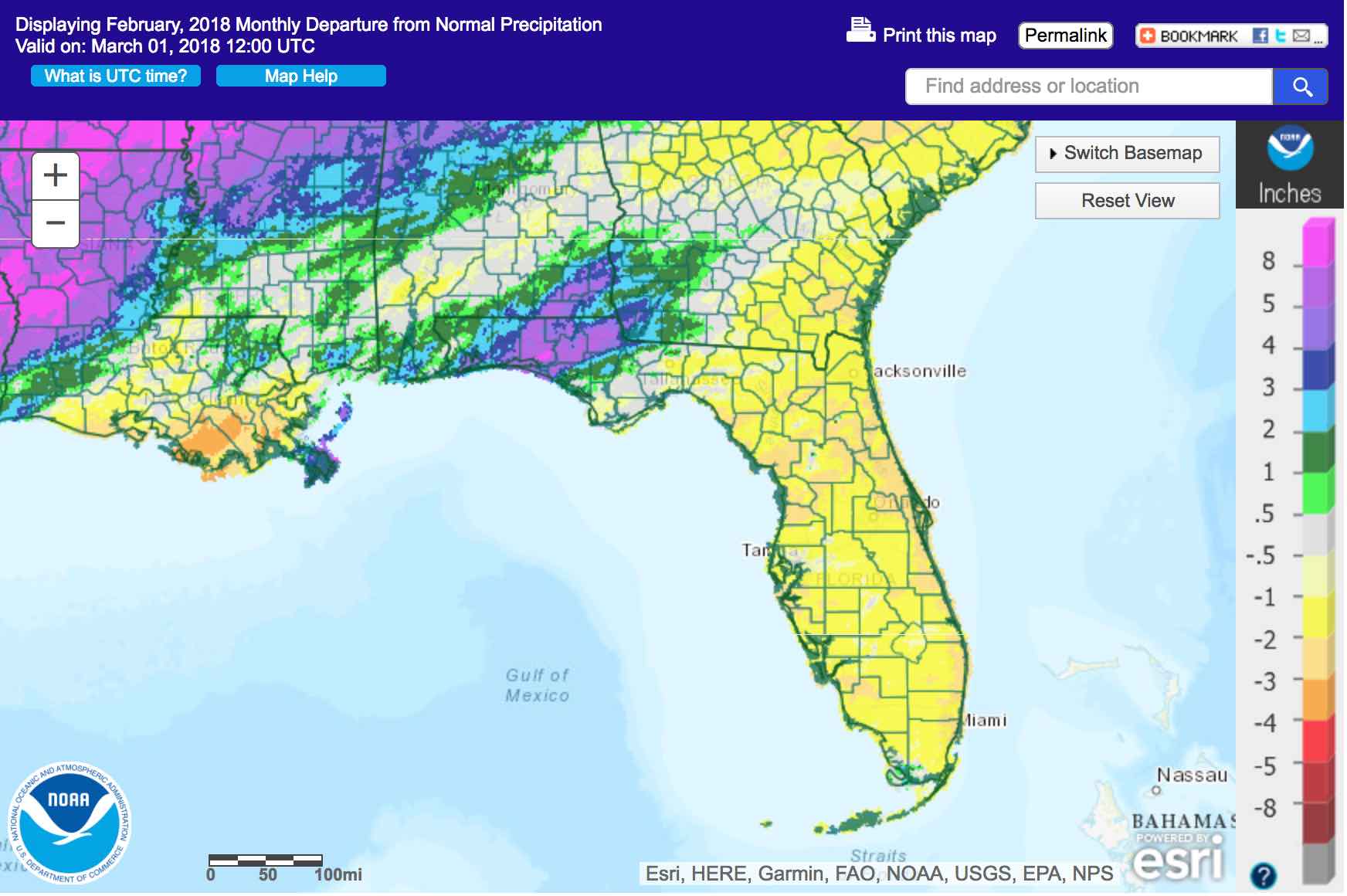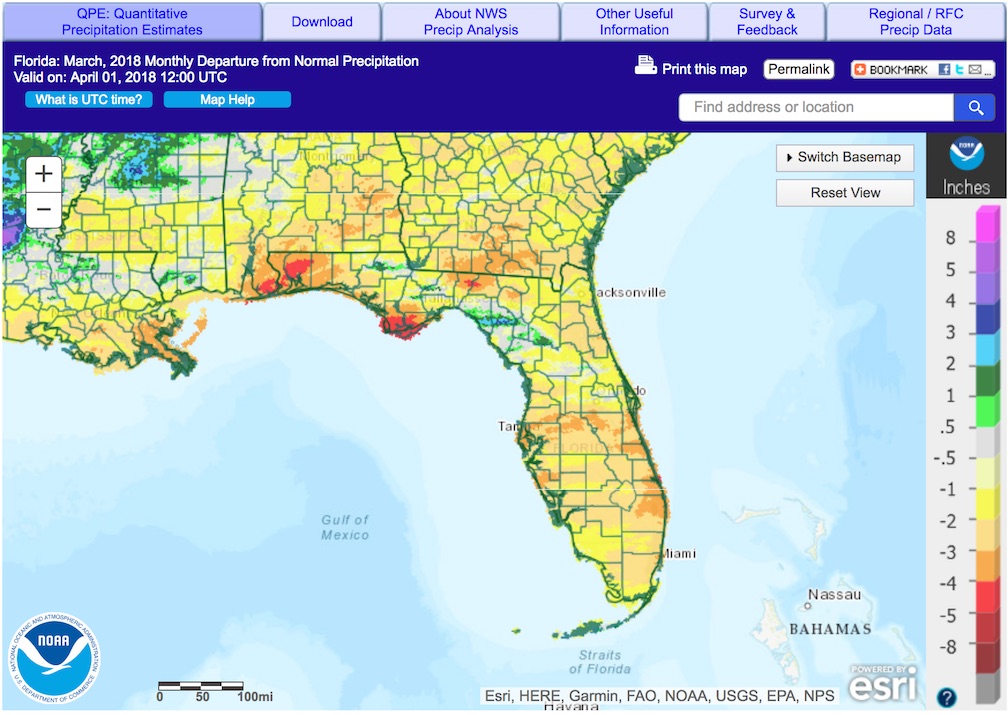Dear Florida Climate Center friends,
We'd like to present you with the March/April 2018 edition of our newsletter. In this newsletter, you'll find our February and March 2018 monthly climate summaries and an update on the wealth of activities in which we've recently been engaged. If you have any questions, please send us an e-mail message at climate@coaps.fsu.edu.
Thanks,
The Staff of the Florida Climate Center
 |
 |
David Zierden
State Climatologist |
Danny Brouillette
Service Climatologist |
|
February and March Climate Summaries for Florida
The Florida Climate Center's
February 2018 Florida Climate Summary and
March 2018 Florida Climate Summary are now available. The monthly summary provides an analysis of temperature and precipitation patterns during the past month across the state, along with data on hazardous weather, drought, the impacts of the weather, and any records tied or broken for the month. During February, temperatures were record warm, averaging 69.0 degrees Fahrenheit, the highest on record since 1895.
The statewide-averaged rainfall total was below the historical median, coming in at 2.40", making for the 42nd-driest February on record. Then, March was several degrees cooler statewide than February was. Specifically, it was the 38th-coldest March, with a statewide mean temperature of 62.7 degrees Fahrenheit. Rainfall was below historical expectations, causing the month to come in as the 32nd-driest one on record, with a statewide average total of 2.17". La Nina (ENSO-negative) conditions continued to be observed in the equatorial Pacific Ocean, although they are observed to be weakening fairly rapidly. For the balance of April and going into May, the
NOAA Climate Prediction Center outlooks Florida for an enhanced probability of below-normal temperatures near the beginning of the period and then above-normal temperatures and a slightly enhanced probability of above-normal rainfall.
The following table gives February average temperatures and departures from normal (˚F) for selected cities.
| Station |
Average Temperature |
Departure from Normal |
| Pensacola |
65.9 |
+11.2 |
| Tallahassee |
65.1 |
+10.4 |
| Jacksonville |
66.1 |
+9.7 |
| Gainesville |
67.0 |
+9.5 |
| Orlando |
71.8 |
+8.8 |
| Tampa |
74.2 |
+10.8 |
| West Palm Beach |
75.3 |
+7.5 |
| Miami |
76.4 |
+6.2 |
| Key West |
76.6 |
+5.6 |
The following table gives February precipitation totals and departures from normal (inches) for selected cities.
| Station |
Total Rainfall
|
Departure from Normal |
| Pensacola |
10.18 |
+5.12 |
| Tallahassee |
4.20 |
-0.65 |
| Jacksonville |
1.73 |
-1.46 |
| Gainesville |
1.58 |
-1.62 |
| Orlando |
0.36 |
-2.02 |
| Tampa |
2.71 |
-0.10 |
| West Palm Beach |
0.18 |
-2.64 |
| Miami |
0.37 |
-1.88 |
| Key West |
0.34
|
-1.15 |
The following table gives March average temperatures and departures from normal (˚F) for selected cities.
| Station |
Average Temperature |
Departure from Normal |
| Pensacola |
62.7 |
+2.3 |
| Tallahassee |
59.2 |
-1.3 |
| Jacksonville |
59.5 |
-2.2 |
| Gainesville |
60.5 |
-1.8 |
| Orlando |
65.1 |
-1.8 |
| Tampa |
66.1 |
-1.2 |
| West Palm Beach |
67.9 |
-2.6 |
| Miami |
70.8 |
-1.8 |
| Key West |
72.1 |
-1.1 |
The following table gives March precipitation totals and departures from normal (inches) for selected cities.
| Station |
Total Rainfall |
Departure from Normal |
| Pensacola |
2.02 |
-3.97 |
| Tallahassee |
6.85 |
+0.91 |
| Jacksonville |
2.14 |
-1.81 |
| Gainesville |
2.41 |
-1.92 |
| Orlando |
0.83 |
-2.94 |
| Tampa |
0.35 |
-2.68 |
| West Palm Beach |
0.80 |
-3.79 |
| Miami |
0.19 |
-2.81 |
| Key West |
2.12 |
+0.07 |
The following schematics map February and March precipitation departures from normal, respectively, across Florida. Images courtesy of the National Weather Service.


|
|
Climatologist Attends Department of Health Meeting.
On 11 April, Danny Brouillette, the Center's service climatologist, was invited to participate in the Technical Advisory Group (TAG) meeting of the Florida Department of Health's (FDoH) Environmental Public Health Tracking (EPHT) program at the FDoH headquarters in Tallahassee. The EPHT program is under the auspices of the federal Centers for Disease Control and is intended to track human diseases related to the environment. Many different stakeholders comprise the TAG, representing a span of environment-interested professionals from across the state. Data collected and maintained by the EPHT are used for projects in the Florida BRACE program in which the Center participates.
|
|
Florida Climate Center Participates in COAPS Open House
|
|
| Danny Brouillette (front right) helps COAPS meteorologist Jeremy Rolph explain an exhibit. |
As a member organization of the Center for Ocean-Atmospheric Prediction Studies (COAPS) at the Florida State University (FSU), the Florida Climate Center once again participated in the COAPS open house. The effort was headed by service climatologist Danny Brouillette and was in conjunction with the FSU Center for Advanced Power Systems' open house in Innovation Park in Tallahassee. COAPS was joined by members of BLAST (Big Bend Leon Association for Science Teaching). COAPS and BLAST presented several demonstrations related to basic weather and climate principles as well as a demonstration that helped explain the Marine Data Center's data-collection and -databasing capabilities.
|
|
State Climatologist Addresses Society of Agricultural and Biological Engineers
State Climatologist David Zierden was an invited speaker at the annual meeting of the Alabama chapter of the American Society of Agricultural and Biological Engineers (ASABE). The meeting was held at Auburn University on 6 April. Zierden presented on climate change and climate variability, the unusual winter of 2017-2018, and other recent weather and climate events.
|
|
Florida Wins Second Place in CoCoRaHS March Madness Observer Recruitment
|
|
| Danny Brouillette (Center's service climatologist, third from left) standing with the CoCoRaHS Cup and staff of NWS Tallahassee. The cup has been sent to South Carolina. |
In March, the Community Collaborative Rain, Hail, and Snow (
CoCoRaHS) network held its annual March Madness observer-recruitment campaign. After coming out on top last year, Florida came in second place among the states (after South Carolina) this year, recruiting 135 new observers. This high level of recruitment would not have been possible without our partners in the news media, National Weather Service, UF Extension, among others.
For enquiries about the program or to become a volunteer observer, please contact service climatologist Danny Brouillette, who is co-coordinator of the network for Florida, at
dbrouillette@coaps.fsu.edu or 850-644-0719.
|
|
Interest "SPARC"ed in Carinata as a Winter Crop
The Tri-State Working Group met in conjunction with the SPARC Project in Tifton, Georgia, on 17 April. The Southeast Partnership for Advanced Renewables from Carinata is a multi-state research program supported by USDA exploring the potential for carinata production in the region. Carinata is an oil seed that can be used for biofuels, namely jet airplane fuel. State Climatologist David Zierden presented on winter climate patterns in the Southeast and how the El Nino/La Nina cycle can effect production. He also presented on risks of freezing weather, which can damage the crop in early stages of development.
|
|
America Peanut Shellers Association Convenes for Spring Confrence
The American Peanut Shellers Association held their spring conference in Albany, Georgia, on 6-7 March
. State Climatologist David Zierden was a featured speaker and presented on recent trends in weather and climate and current conditions in the Southeast heading into planting season. Of particular interest was exploring possible causes for peanut yield reductions in 2017 in North Florida and South Georgia and how increasing temperatures may play a role. More information about the event can be found here.
|
| About Us The Florida Climate Center is part of a three-tiered system of national, regional, and state climate offices, including NOAA's National Centers for Environmental Information (NCEI - in Asheville, North Carolina) and the Southeast Regional Climate Center (in Chapel Hill, North Carolina). The Florida State Climatologist and other staff at the Florida Climate Center provide the following information and services to the people of Florida:
· Climate Data: Historical weather observations for weather stations throughout the state of Florida. We are able to provide data for most stations from 1948-present.
· Climate Information: Long-term historical averages for various stations, climate divisions, and the entire state.
· Extreme Event Records: Information and analyses on extreme events such as freezes, droughts, floods and hurricanes.
· Special Analysis: With their vast knowledge of El Niño, La Niña and climate variability, the State Climatologist and staff can offer expert insight into Florida's climate trends.
· Outreach: Activities, presentations, and workshops that inform and educate the people of Florida about current and emerging climate issues. We also coordinate volunteers for the Community Collaborative Rain, Hail & Snow Network (CoCoRaHS).
More About Us |
|